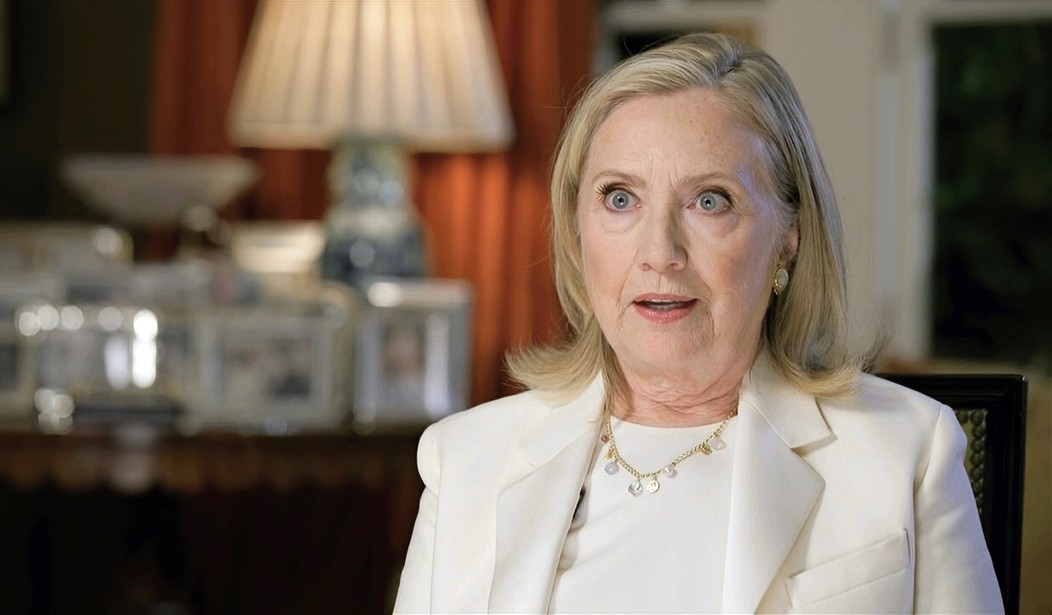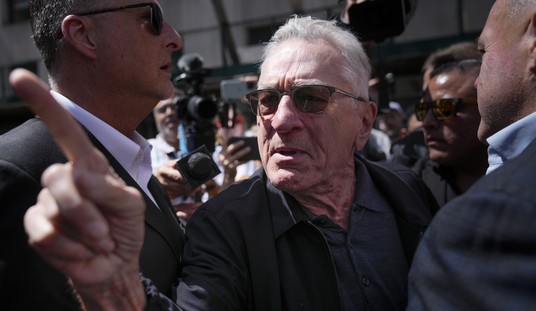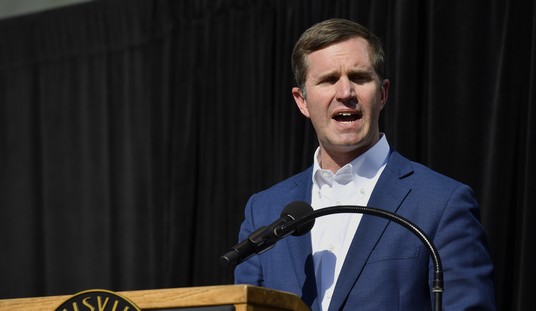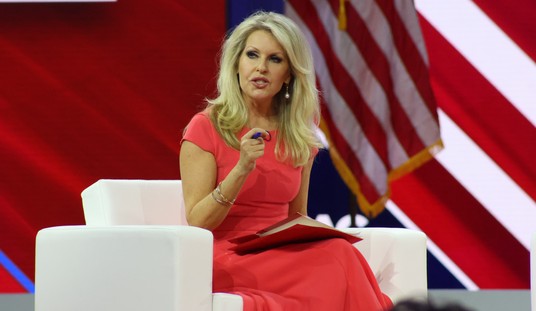Today is the twenty-second anniversary of September 11, 2001, and it is absolutely appropriate to remember that crime against humanity. Nothing I say in his article should be interpreted as taking away from that remembrance. But it is also the anniversary of the attack on the American diplomatic compound in Benghazi.
Here’s a pretty neutral post on the subject:
Chris Stevens
— Andrew Pollack (@AndrewPollackFL) September 11, 2023
Sean Smith
Ty Woods
Glen Doherty
Let's not forget these four American heroes who died in Benghazi on 9/11/2012.
And here’s a less neutral post on the subject:
Never forget these 4 names:!Ambassador Chris Stevens, Tyrone Woods, Sean Smith, Glen Doherty abandoned and murdered in #Benghazi due to @HillaryClinton negligence. #neverforgetBenghazi pic.twitter.com/9r2s0NWbCX
— Diane B (@dmb1031) September 11, 2023
A great deal has been investigated, written, and so on about the actions before and during the attack, and whether or not anyone was negligent. That’s a valid subject of discussion.
But I always felt that what was truly outrageous about it was downplayed in that discussion: The way the Obama administration scapegoated a movie for the attack.
To put it all in perspective, Freedom of Expression and Freedom of Religion was very much in contention at the time. In 2005, the Danish newspaper Jyllands-Posten published several cartoons depicting Mohammed. Sometimes they were insulting, sometimes much less so. But under some interpretations of Islam, even depicting Mohammed, however benignly, was verboten. I say ‘some interpretations’ because there are also famous artwork depicting Mohammed made by Muslims. For instance, according to this article…
An Academic Is Fired Over a Medieval Painting of the Prophet Muhammad - New Lines Magazine https://t.co/uNXSdhQxDw
— David Boaz (@David_Boaz) January 3, 2023
… this image …
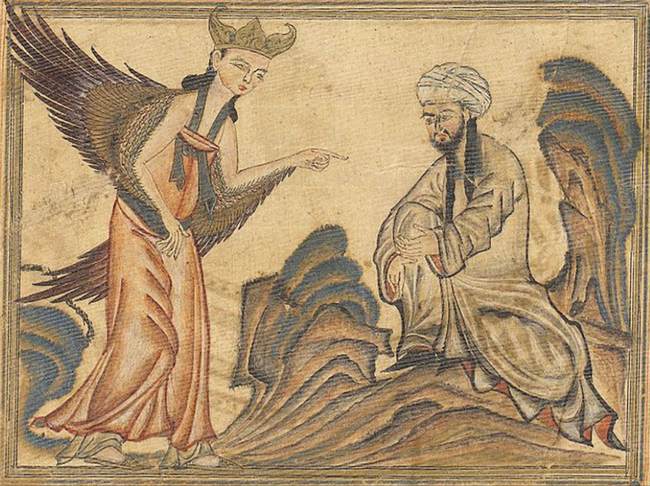
… ‘is included in a historical text written by Rashid al-Din, a famous 14th-century Muslim vizier and historian.’ So, while this information doesn’t make it clear that the artist was a Muslim, obviously Rashid al-Din didn’t think it was blasphemy. The notion that people cannot depict Mohammed at all is not an uncontested interpretation of Islam in all places at all times.
Still, I am not here to tell a Muslim how to interpret their own faith. I am woefully unqualified and you can believe whatever you want, anyway. The right to believe, without words or actions, is absolute, even if England apparently hasn’t gotten that memo:
Woman arrested for silent prayer outside abortion clinic notches legal win but still faces potential charges https://t.co/FzXPLh1VbY
— Fox News (@FoxNews) June 14, 2023
But what someone does, is another matter. If someone believes in the old Aztec religion and plans to carry out a human sacrifice, the government has a duty to stop you—even if the proposed sacrifice consents. That hypothetical neo-Aztec has the right to believe he should be allowed to engage in human sacrifice, and even to say he believes this (as long as his words don’t cross the line into a threat). But he can’t rightfully do it. Likewise, if you think you have the right to murder a person because they have blasphemed your faith, my response is the same: You can think it, you can advocate for it, but the government has a duty to stop you if you try to do it.
When it comes to Freedom of Expression and Freedom of Religion, it is not enough for the government to avoid violating these rights. Rather, the government has a moral duty to protect those rights against all comers. When the government censors you, it fails. But when Salman Rushdie was horribly wounded on American soil (apparently, in retaliation for his alleged blasphemy) ...
Sir Salman Rushdie says he has "crazy dreams" about attack in New York https://t.co/zag6iAs7tT
— BBC News (World) (@BBCWorld) July 12, 2023
… our government failed in its duty to protect his rights, too. I'm not saying our government suddenly became illegitimate or something as dramatic as that. Governments are made up of human beings and, thus, they are only human, and they will fail sometimes. But the duty exists nonetheless and we failed Mr. Rushdie.
Furthermore, Freedom of Religion absolutely requires the right to blaspheme. It is literally impossible to live together in equality under any other approach. For instance, I believe Jesus is the son of God. Muslims deny this. And as an outsider, it seems crucial to their religion. They believe Mohammed is God’s greatest prophet, but how could you believe that if God had also sent his son to this world? So denying the divinity of Jesus seems to be critical to elevating Mohammed. But it is at least heresy to me, if not blasphemy. And I’m fine with it. I disagree, of course, but you won’t catch me doing more than politely expressing disagreement. The truth is that most religions are heretical or blasphemous to at least one other religion and usually more than one. We have to allow for blasphemy and heresy for that reason alone.
Additionally, Freedom of Religion includes freedom of choice regarding religion. That includes the right not to believe in a particular religion, or any religion, or to convert from one religion to another (including ‘converting’ to atheism). And as I have said before in the context of voting, if you have a right to a choice, you have a right to receive information about that choice, and that means you have to have a right to freely discuss that choice (because if no one can discuss the subject freely, then you will have no one to receive information from).
All of which is to say that publishing cartoons depicting Mohammed—whether they were otherwise offensive or not—is a matter of Freedom of Expression and Freedom of Religion. And while the First Amendment prohibits the government from violating those rights, there is also a moral obligation on the government’s part to protect us from any private citizen who would do so as well.
To test those rights, the Jyllands-Posten published its cartoons. Here’s a screencap of the page:
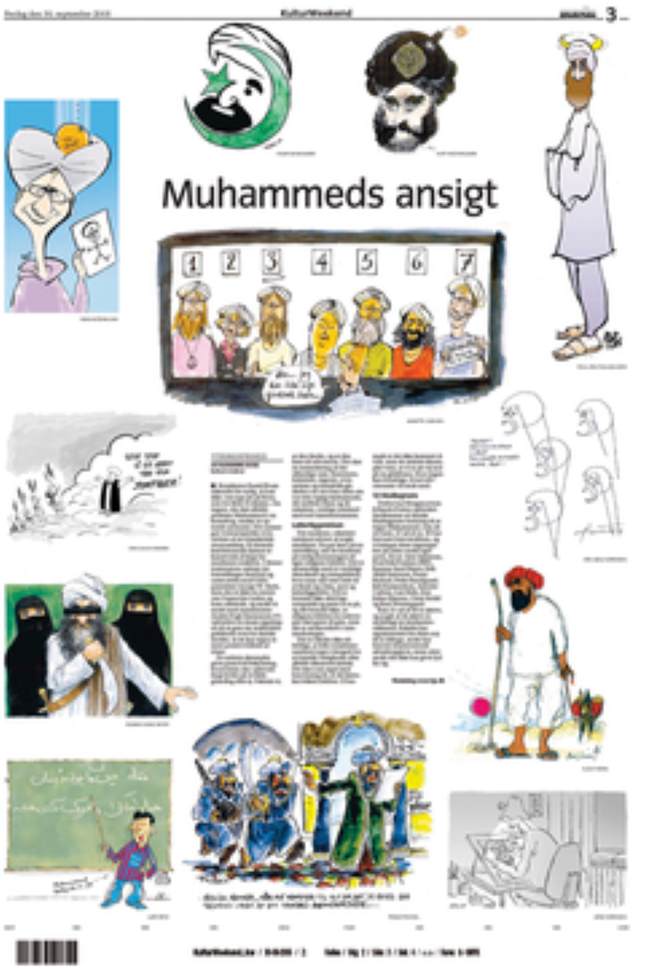 As you might know, there was a global controversy about it, thousands of Islamofascists calling for the death of these cartoonists.
As you might know, there was a global controversy about it, thousands of Islamofascists calling for the death of these cartoonists.
And for the record, let me explain what I mean by an 'Islamofascist.' There are some alleged Muslims who interpret Islam in a way that makes them the enemy of freedom and republican principles. I call them ‘Islamofascists’ to differentiate them from the ordinary, decent Muslims I regularly interact with, who reject those fascist principles. In all frankness, I have never met an Islamofascist in person, but they obviously exist. There are even some people who argue that Islamofascists are not Muslims at all.
As for calling for the death of cartoonists, one would expect that kind of behavior from Islamofascists. I mean, it’s kind of implied in my nomenclature. But what was unexpected was the sheer cowardice shown by the media. The controversy was international news, but most outlets wouldn’t show us any of the cartoons as I just did.
I mean, I might be dating myself a bit here, but I had seen a large number of religious controversies over various artworks over the years. There was the P*ss Christ where an image of my lord and savior was dipped in urine:
 And there was also The Holy Virgin Mary, a painting that used, in part, elephant dung as a medium:
And there was also The Holy Virgin Mary, a painting that used, in part, elephant dung as a medium:
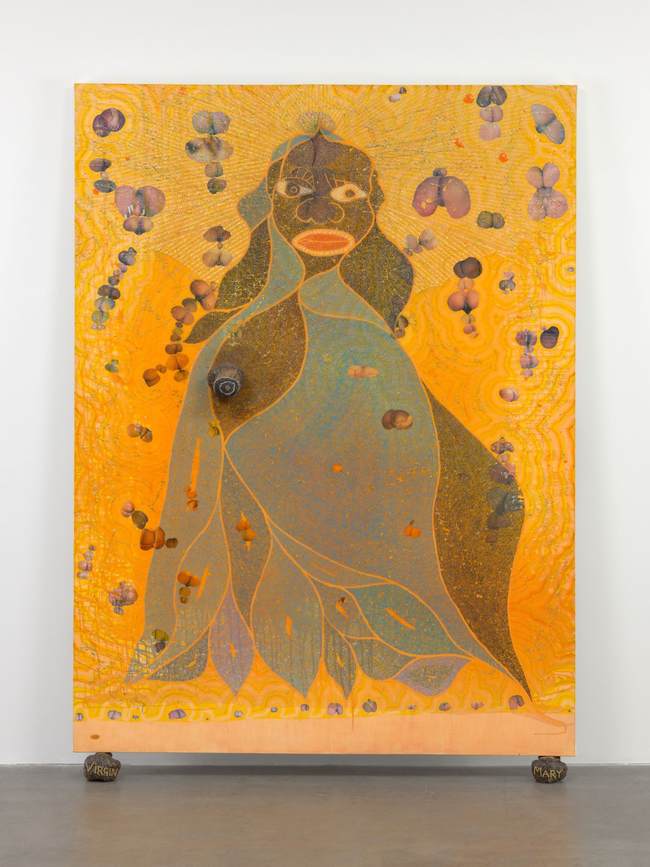 When those works became controversial, the news would invariably share an image of the work so ordinary people could get a look at it and see what the big deal is. But when it was Islamofascists raising a ruckus, suddenly they didn’t want to show us the works that was sparking controversy. They claimed it was sensitivity, but they never showed that kind of sensitivity toward Christians. So, the real issue was fear.
When those works became controversial, the news would invariably share an image of the work so ordinary people could get a look at it and see what the big deal is. But when it was Islamofascists raising a ruckus, suddenly they didn’t want to show us the works that was sparking controversy. They claimed it was sensitivity, but they never showed that kind of sensitivity toward Christians. So, the real issue was fear.
The issue erupted again in 2010 when the South Park announced they were going to have Mohammed depicted on the show. Mind you, South Park had depicted Mohammed before, as part of the Super Best Friends, a parody of the Super Friends, the South Park version featuring multiple religious figures as superheroes. You can see that, here:
But suddenly it was a big deal when they did it again because this was after September 11, 2001. Thus, there were protests and … Comedy Central chickened out. They aired the episode but cut out the moment when Mohammed was depicted. This is allegedly what they cut (as part of a parody of The Family Guy):
And it gets dumber than that. When people pointed out that South Park and Comedy Central had previously aired a depiction of Mohammed, they went back and removed the Super Best Friends episode in its entirety. Even Max (formerly HBO Max) which depicts itself as daring and all that, doesn’t have the episode.
I, and many other people, were so infuriated, we decided to hold an Everybody Draw Mohammed day, on May 20, 2010. And I know more about that than I am going to say, here. There was another cartoonist who suggested it and the idea took off. But the person then became scared and released a video trying to get from the controversy, so I won’t name her and remind people of who started it. Besides by then the idea really had grown beyond that originator, so we carried on without that person.
I always thought the best explanation for why the movement was so appealing was to liken it to the powerful 'I am Spartacus' scene in the movie Spartacus:
In that scene, the slave rebellion led by Spartacus was defeated and the Romans offered to spare the lives of most of the slaves, if they would just tell them which one was Spartacus. They didn’t know what he looked like. The Romans wanted to single him out for the cruelest punishment, as an example to the next slave who thinks of starting a rebellion. And you see that Krik Douglas, as Spartacus, is ready to give himself up, but the other slaves wouldn’t let him do it. Those slaves said, in essence, ‘you don’t get to single one of us out. Whatever you are going to do to him, you are going to have to do to all of us or none of us.’ They said it by each of them shouting ‘I am Spartacus.’
And that’s what well over 100,000 people did, worldwide. On May 20, 2010, we told the Islamofascists that if they were going to kill everyone who drew a picture of Mohammed, they would have to kill all of us. Some of drawings were deeply offensive beyond the mere fact that it depicted Mohammed. Some of them were nice. Some of them were actually lovely pieces of art. Some of them were the Dreaded Stick Figures of Blasphemy—pictures so bad you’d have no idea who was being depicted except that they labeled a stick figure as ‘Mohammed.’
And our goal wasn’t to actually die or provoke a fight. I always interpreted it as wanting the Islamofascists to see so many people defying them, that they would realize it was useless to try to kill all of us. We hoped literally they would give up on trying to harm the Jyllands-Posten cartoonists, the makers of South Park and anyone else they wanted to kill for blasphemy. We did this to protect others. At least, that is how I saw it.
And it was in this atmosphere, in the fallout over Benghazi, the Obama administration scapegoated a movie for the attack. Even if it somehow was the source of the attackers' anger—and there is severe doubt on that point—they acted like the filmmakers were morally blameworthy. Specifically, I am talking about a movie called ‘The Innocence of Muslims,’ by Nakoula Basseley Nakoula. The Obama administration actually apologized for it, saying:
The Embassy of the United States in Cairo condemns the continuing efforts by misguided individuals to hurt the religious feelings of Muslims – as we condemn efforts to offend believers of all religions. Today, the 11th anniversary of the September 11, 2001 terrorist attacks on the United States, Americans are honoring our patriots and those who serve our nation as the fitting response to the enemies of democracy. Respect for religious beliefs is a cornerstone of American democracy. We firmly reject the actions by those who abuse the universal right of free speech to hurt the religious beliefs of others
They also ran ads in Pakistan apologizing for the movie. And let’s be blunt. This was a distraction from the failures of the Obama administration in Benghazi. They were pointing the finger at the movie, to distract from their own failures.
But it gets worse from there. Then the FBI investigated the filmmaker. Now, while we know today that Nakoula made the movie, it was initially made under a pseudonym: Sam Bacile.
So, ask yourself a simple question: What cause did the FBI have for investigating the movie? None. They had no reason to believe that ‘Sam Bacile’ committed a crime. The only thing they knew about his movie was that it offended Islamofascists. But lest you think the politicization of the FBI began in 2016, they had a scapegoat to identify and eventually they did. That is, but for the conduct of the FBI he might have remained anonymous. So, they doxed him and for the rest of his life, he will have to worry about being murdered for blasphemy.
And it gets even worse than that. You see, it turned out that Nakoula Basseley Nakoula had a prior bank fraud conviction and by using YouTube, he was technically violating his parole. So they had their hook to throw him in prison. They started their investigation without evidence of a crime and hit the jackpot.
This wasn’t about the crime. Rich Lowry wrote a piece about it …
Opinion: The Benghazi patsy - Rich Lowry - http://t.co/0eMMu16Rqo: http://t.co/ydyLgzTnHc via @POLITICO
— jimtreacher.substack.com (@jtLOL) May 9, 2013
… and this is what he said:
In the weeks after the attack on U.S. facilities in Benghazi that killed Ambassador Chris Stevens and three others, the Obama administration claimed the terrorist assault had been the outgrowth of a demonstration against the Nakoula video. The administration ran public service announcements in Pakistan featuring President Barack Obama saying the U.S. had nothing to do with it. In a speech at the United Nations around this time, the president declared — no doubt with Nakoula in mind — ‘The future must not belong to those who slander the prophet of Islam.’
After Benghazi, the administration was evidently filled with a fierce resolve — to bring Nakoula Basseley Nakoula to justice. Charles Woods, the father of a Navy SEAL killed in Benghazi, said Secretary of State Hillary Clinton told him when his son’s body returned to Andrews Air Force Base: ‘We will make sure that the person who made that film is arrested and prosecuted.’
Lo and behold, Nakoula was brought in for questioning by five Los Angeles County sheriff’s deputies at midnight, eventually arrested and held without bond, and finally thrown into jail for a year. …
A violation of probation, though, usually produces a court summons and doesn’t typically lead to more jail time unless it involves an offense that would be worth prosecuting in its own right under federal standards. Not for Nakoula.
This wasn’t a case of nailing Al Capone on tax evasion. As Nina Shea of the Hudson Institute points out, Al Capone’s underlying offense was racketeering and gangland killings. Nakoula Basseley Nakoula’s underlying offense wasn’t an underlying offense. He exercised his First Amendment rights.
I won’t pretend Nakoula is any kind of angel, but you don’t have to be an angel to enjoy the protection of the First Amendment. But rather than robustly defend the principles of Freedom of Expression and Freedom of Religion, the Obama administration threw those principles under the bus because they needed a scapegoat. Islamofascists attacked Americans on September 11, 2012, but it was the Obama administration, acting in the wake of that attack, that struck a blow against the American values of Freedom of Expression and Freedom of Religion.
And it is worth remembering that, today, too.


















